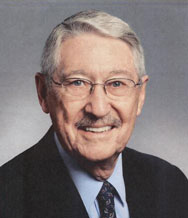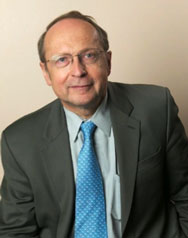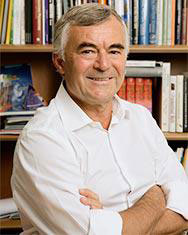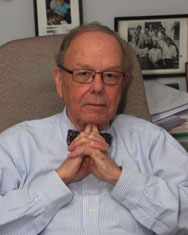
ESAG Participants
Max D. Cooper, M.D.
 Max D. Cooper, M.D., Professor of Pathology and Laboratory Medicine, is a Georgia Research Alliance Eminent Scholar and member of the Vaccine Center at the Emory University School of Medicine. His laboratory currently studies the evolution of adaptive immunity and explores the use of lamprey monoclonal antibodies for diagnosis and therapy of infectious diseases and lymphoid malignancies in humans.
Max D. Cooper, M.D., Professor of Pathology and Laboratory Medicine, is a Georgia Research Alliance Eminent Scholar and member of the Vaccine Center at the Emory University School of Medicine. His laboratory currently studies the evolution of adaptive immunity and explores the use of lamprey monoclonal antibodies for diagnosis and therapy of infectious diseases and lymphoid malignancies in humans.
While at the University of Minnesota from 1963-1967 Cooper worked with Robert Good to define the independent development of the functionally-interactive T and B cell lineages. With UAB graduate student Paul Kincade, he discovered antibody class switching by B cells. Dale Bockman and Cooper described the lymphoid follicle-associated epithelial “M” cells in the intestine and their transcytotic function. With Martin Raff and John Owen at University College London, Cooper defined the fetal liver and bone marrow origin of B cells and pre-B cells. He is a member of the U.S. National Academy of Sciences, the Academy of Medicine, the American Academy of Arts and Sciences, a foreign member of the French Academy of Sciences and the Royal Society of London. Cooper is a former president of the American Association of Immunologists, the Clinical Immunology Society and the Kunkel Society. Honors include the Society for Experimental Biology and Medicine Founder’s Award (1966), Sandoz Prize in Immunology (1990), American College of Physicians Science Award (1994), American Association of Immunologists (AAI) Lifetime Achievement Award (2000), AAI-Dana Foundation Award in Human Immunology Research (2006), Avery-Landsteiner Prize (2008), the Robert Koch Prize (2010), AAI Excellence in Mentoring Award (2012) and the Japan Prize (2018).
Andrew D. Luster, M.D., Ph.D.
Persis, Cyrus and Marlow B. Harrison Professor of Medicine at Harvard Medical School
E. Alexandria and Michael N. Altman Chair in Immunology at Massachusetts General Hospital
 Dr. Luster is Chief of the Division of Rheumatology, Allergy & Immunology, and Director of the Research Center for Immunology & Inflammatory Diseases at Massachusetts General Hospital. He is the Persis, Cyrus and Marlow B. Harrison Professor of Medicine at Harvard Medical School and the E. Alexandria and Michael N. Altman Chair in Immunology at Massachusetts General Hospital. Dr. Luster received his B.S. degree in 1981 summa cum laude from Duke University, his Ph.D. from Rockefeller University in 1987, and his M.D. from Cornell University Medical College in 1988. Dr. Luster pursued his residency in medicine and fellowship in infectious diseases at Massachusetts General Hospital, followed by a post-doctoral fellowship in the Department of Genetics at Harvard Medical School. In 1994, Dr. Luster established his laboratory at MGH, and in 2000, he was appointed Chief of a new Division in the Department of Medicine focused on basic, translational and clinical Immunology.
Dr. Luster is Chief of the Division of Rheumatology, Allergy & Immunology, and Director of the Research Center for Immunology & Inflammatory Diseases at Massachusetts General Hospital. He is the Persis, Cyrus and Marlow B. Harrison Professor of Medicine at Harvard Medical School and the E. Alexandria and Michael N. Altman Chair in Immunology at Massachusetts General Hospital. Dr. Luster received his B.S. degree in 1981 summa cum laude from Duke University, his Ph.D. from Rockefeller University in 1987, and his M.D. from Cornell University Medical College in 1988. Dr. Luster pursued his residency in medicine and fellowship in infectious diseases at Massachusetts General Hospital, followed by a post-doctoral fellowship in the Department of Genetics at Harvard Medical School. In 1994, Dr. Luster established his laboratory at MGH, and in 2000, he was appointed Chief of a new Division in the Department of Medicine focused on basic, translational and clinical Immunology.
Over the past three decades, Dr. Luster has been intimately associated with the development of the chemokine field. He has been a pioneer in this field and has made multiple seminal contributions to understanding the roles of this important family of immunoregulatory chemotactic cytokines in health and diseases since his initial discovery of CXCL10 (IP-10). His laboratory has helped define how chemokines and lipid chemoattractants function in immune cell trafficking necessary to generate innate and adaptive immune responses in host responses to infectious pathogens and cancer, as well as in the pathogenesis of immune and inflammatory diseases, including autoimmune and allergic diseases, such as arthritis and asthma.
Dr. Luster has received numerous awards and honors, including a Damon Runon-Walter Winchell Postdoctoral Fellowship, a Cancer Research Institute Investigator Award, a Culpeper Medical Scientist Award, an NIH MERIT Award, and the 2011 Lee C. Howely Sr. Prize for Arthritis Research from the Arthritis Foundation. He has been elected to the American Society for Clinical Investigation and the American Association of Physicians.
Peter Palese, Ph.D.
Professor and Chair, Department of Microbiology
Professor, Department of Medicine, Icahn School of Medicine at Mount Sinai
 Peter Palese is Professor and Chair of the Department of Microbiology at the Icahn School of Medicine at Mount Sinai. His research is in the area of RNA-containing viruses with a special emphasis on influenza viruses. He established the first genetic maps for influenza A, B, and C viruses, identified the function of several viral genes, and defined the mechanism of neuraminidase inhibitors (which are now FDA-approved antivirals).
Peter Palese is Professor and Chair of the Department of Microbiology at the Icahn School of Medicine at Mount Sinai. His research is in the area of RNA-containing viruses with a special emphasis on influenza viruses. He established the first genetic maps for influenza A, B, and C viruses, identified the function of several viral genes, and defined the mechanism of neuraminidase inhibitors (which are now FDA-approved antivirals).
He was also a pioneer in the field of reverse genetics for negative strand RNA viruses. His laboratory’s research is currently focused on the development of a universal influenza virus vaccine and oncolytic viruses. Palese is a member of the National Academy of Sciences, the National Academy of Medicine (formerly IOM), and the American Academy of Arts and Sciences.
He is also a corresponding member of the Austrian Academy of Sciences and a member of the German Academy of Sciences (Leopoldina). Palese serves on the editorial board for the Proceedings of the National Academy of Sciences and is a former president of the Harvey Society and the American Society for Virology. Palese has received honorary doctorate degrees from The Mount Sinai School of Medicine, Baylor College of Medicine and McMaster University; he is a recipient of the Robert Koch Prize, the Sanofi-Institut Pasteur Award, the Beijerinck Virology Prize, and the Maurice Hilleman/Merck Award.
Rino Rappuoli, Ph.D.
 Rino Rappuoli is Global Head Research and Development at Novartis Vaccines and is based in Siena, Italy. He earned his PhD in Biological Sciences at the University of Siena and has served as visiting scientist at Rockefeller University in New York and Harvard Medical School in Boston. Prior to the present position he was head R&D of Sclavo and then head of vaccine research and Chief Scientific Officer of Chiron Corporation.
Rino Rappuoli is Global Head Research and Development at Novartis Vaccines and is based in Siena, Italy. He earned his PhD in Biological Sciences at the University of Siena and has served as visiting scientist at Rockefeller University in New York and Harvard Medical School in Boston. Prior to the present position he was head R&D of Sclavo and then head of vaccine research and Chief Scientific Officer of Chiron Corporation.
Several molecules he worked with became part of licensed vaccines. These include: CRM197 used in H.influenzae, N.meningitidis, and pneumococcus vaccines; PT9K/129G, a genetically detoxified pertussis toxin used for an acellular vaccine against pertussis; the first conjugate vaccine against meningococcus C and later against meningococcus ACYW; the MF59 adjuvant used in seasonal and pandemic influenza vaccines and the FHBP, NadA and NHBA antigens derived from the genome of meningococcus B that made possible the development of Bexsero.
He was elected member of the US National Academy of Sciences (NAS) and the European Molecular Biology Organization (EMBO). Awards conferred include: Paul Ehrlich and Ludwig Darmstaedter Prize (1991), the Gold Medal by the Italian President (2005), the Albert B. Sabin Gold Medal (2009), the Lifetime Achievement Award from the Institute of Human Virology in Maryland (2010), and the Excellence Award from the European Society of Clinical Microbiology and Infectious Diseases (2011). In 2013 he was nominated third most influential person worldwide in the field of vaccines (Terrapin).
He has introduced several novel scientific concepts (genetic detoxification, 1987, cellular microbiology, 1996; reverse vaccinology, 2000; pangenome, 2005, structural vaccinology, 2008).
Emil Unanue, M.D.
Paul & Ellen Lacy Professor, Department of Pathology and Immunology, Washington University School of Medicine
 Emil Unanue is the Paul and Ellen Lacy Professor in the Department of Pathology and Immunology at Washington University. He did post doctoral training at the Scripps Research Institute and then in London at the National Institute for Medical Research at Mill Hill, with Ita Askonas. It was in London that his research interests developed in antigen processing and presentation. His work in this area continued during his time at Harvard Medical School where he was Professor of Immunopathology; and at Washington University School of Medicine where he headed the Department of Pathology and Immunology for 21 years. Unanue’s distinctions include the Albert Lasker Basic Medical Research Award, the Gairdner award, and membership in the National Academy of Sciences. His major research work centers on establishing the cellular and biochemical basis of recognition of protein antigens by the immune system and on examining the role of histocompatibility molecules (the molecules encoded in the Major Histocompatibility Complex - MHC) in antigen presentation. In the early 1980s his group made two fundamental observations, that protein antigens are processed by antigen presenting cells (APC) and that MHC molecules are peptide binding molecules. These findings have allowed for the precise molecular understanding of T cell recognition and have opened the field for a rational analysis of immunogenicity. His laboratory continues investigations on the cellular and biochemical basis for the immunogenicity of protein antigens. Current investigations examine the presentation of self proteins in autoimmune diabetes.
Emil Unanue is the Paul and Ellen Lacy Professor in the Department of Pathology and Immunology at Washington University. He did post doctoral training at the Scripps Research Institute and then in London at the National Institute for Medical Research at Mill Hill, with Ita Askonas. It was in London that his research interests developed in antigen processing and presentation. His work in this area continued during his time at Harvard Medical School where he was Professor of Immunopathology; and at Washington University School of Medicine where he headed the Department of Pathology and Immunology for 21 years. Unanue’s distinctions include the Albert Lasker Basic Medical Research Award, the Gairdner award, and membership in the National Academy of Sciences. His major research work centers on establishing the cellular and biochemical basis of recognition of protein antigens by the immune system and on examining the role of histocompatibility molecules (the molecules encoded in the Major Histocompatibility Complex - MHC) in antigen presentation. In the early 1980s his group made two fundamental observations, that protein antigens are processed by antigen presenting cells (APC) and that MHC molecules are peptide binding molecules. These findings have allowed for the precise molecular understanding of T cell recognition and have opened the field for a rational analysis of immunogenicity. His laboratory continues investigations on the cellular and biochemical basis for the immunogenicity of protein antigens. Current investigations examine the presentation of self proteins in autoimmune diabetes.
